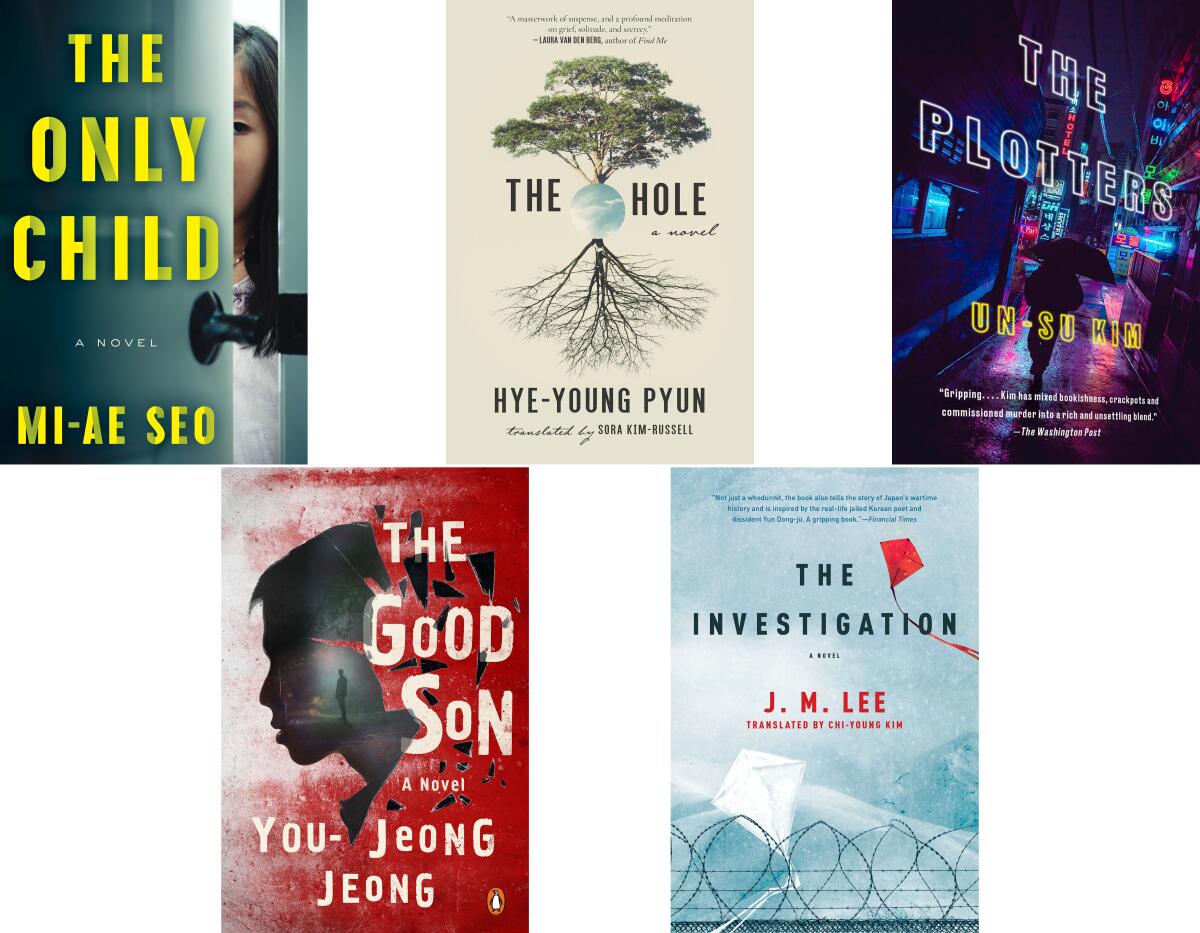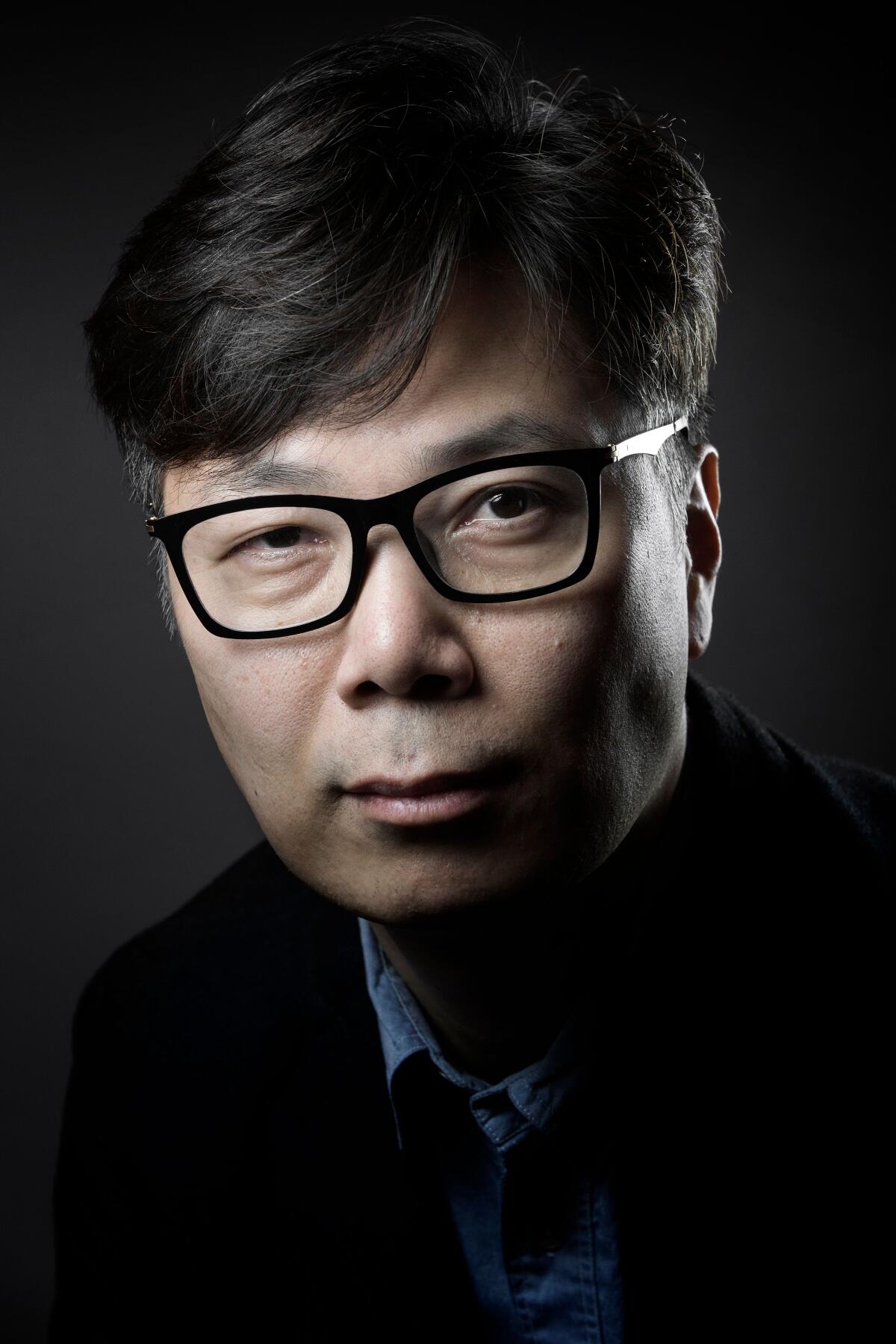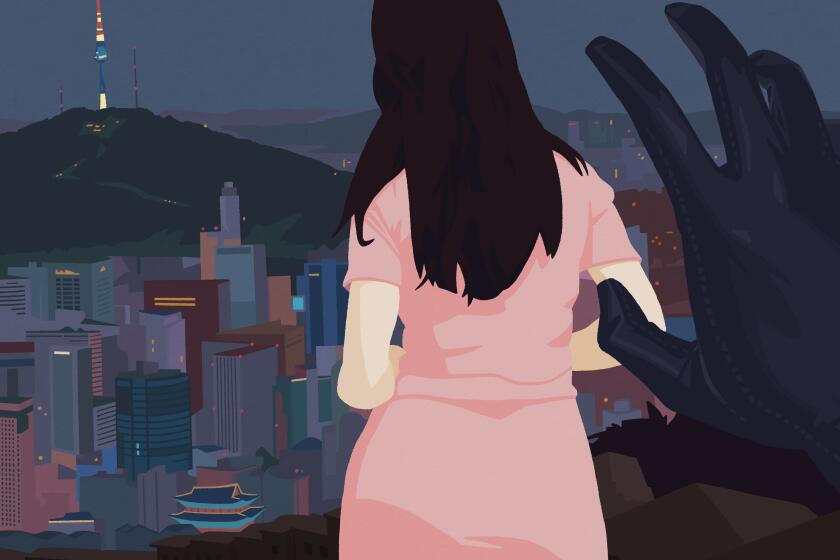Five authors of Korean thrillers you should be reading, by Paula Woods

- Share via
The list of top Korean crime novelists published in English — some of whom I’ve read, others I can’t wait to read — is woefully short but sure to grow. Some are pure mystery writers, others more literary but dabbling in the genre, as does much of the best writing coming from Korea today. There are voyages through Korean history, assassinations and suicides and bone-chilling family dramas, with a little of the phantasmagorical thrown in if that’s your thing. Make particular note of the forthcoming titles — signs of much more to come.
You-Jeong Jeong
Born in a rural county in South Korea’s South Jeolla province, Jeong was a nurse before turning to writing full time. Her novels have been bestsellers in South Korea; “The Good Son,” her first to be translated into English, has sold over a million copies. It’s inspired by the shocking double murder of two wealthy Korean parents by their son upon his return from a disastrous gambling trip to Las Vegas. In the novel, Han Yu-jin is awakened by the smell of blood in his Seoul home, only to discover his mother has been murdered in the kitchen, her throat slit and her body carefully posed. Yu-Jin’s constant headaches may remind readers of recent unreliable-narrator mysteries, but Jeong unspools the truth in a way that will make you fear for his community and remaining family. “The Good Son” reminds me of Patricia Highsmith’s “The Talented Mr. Ripley,” but Jeong is saying something about the complicated relationships among mothers and sons and siblings that will also resonate with American readers. Look for Jeong’s next thriller, “Seven Years of Darkness,” out from Penguin in June.
Un-Su Kim
“The Plotters,” Kim’s energetic 2019 English-language debut, starts out as a character study of Reseng, a 32-year-old Seoul hit man rescued as an infant from a garbage can by nuns, then adopted by an assassin known only as Old Raccoon and raised in a library/criminal headquarters called the Doghouse. These hit men take their orders from “plotters,” a shadowy group with an array of clients. As Reseng steps out of line, he comes to feel trapped between the teachings of his mentor and the corporate sensibilities of the new wave, embodied by Hanja, a former Old Raccoon acolyte with his own shop — “like any other boss of a security company.” Hanja has the hit men killing one another and Reseng on the run. Reseng reemerges as the lethal weapon in a female-led plot to end the cycle of killings, resulting in a showdown reminiscent of Paris and Achilles, one of the myths that has haunted him since childhood. While “The Plotters” might not work for mystery purists, Kim never lets the pace lag in this wild yet thought-provoking novel.
Young-Ha Kim

The author served as an assistant detective with the South Korean Army’s military police before turning to fiction. A prolific novelist in his country, he’s published five books in English, including his debut, “I Have the Right to Destroy Myself,” and the thriller “Your Republic Is Calling You.” The latter unfolds over a single day as a North Korean spy living quietly in the south is suddenly called back to Pyongyang. “Diary of a Murderer,” Kim’s latest, is a collection of stories whose indelible characters include the child victim of a kidnapping who’s bonded with his abductor and a hit man with Alzheimer’s who muses, “It’s been twenty-five years since I last murdered someone, or is it twenty-six?”
Jung-Myung (J.M.) Lee
Lee’s novels have sold millions of copies in South Korea, and some of them, most notably “Painter of the Wind,” have become successful television series. They are largely historical but frequently incorporate mystery elements. “The Investigation,” his first to be published in English, was a Vanity Fair top mystery pick for 2015. On the surface it’s a mystery set in Japan’s Fukuoka prison in 1944. There, a young guard, the literature-loving Watanabe Yuichi, is assigned to investigate the murder of a co-worker, a decorated war veteran whose brutality has earned him the nickname “The Butcher.” Yuichi finds a poem on the Butcher’s body written by an inmate, a fictionalized version of the celebrated poet Yun Dong-ju (who died in Fukuoka for his participation in the Korean resistance). In Lee’s lyrical telling, Yun’s poems so move Yuichi that he vows to protect them and the poet even as World War II comes to its horrific end. Other Lee novels that blend murder and international politics include “The Boy Who Escaped Paradise,” about a young, North Korean defector with Asperger’s.
Hye-Young Pyun
Pyun is the first Korean native to have a short story published in the New Yorker. “Caring for Plants” became the seed for her allegorical novel, “The Hole,” which won the Shirley Jackson Prize in 2017. “The Hole” tells the story of Oghi, a tenured professor paralyzed by a car crash that killed his wife. His caretaker is his mother-in-law, who mutters, “Save me” incessantly as she tends her daughter’s abandoned garden. While Oghi watches, as helpless as the writer in Stephen King’s “Misery,” his mother-in-law digs increasingly larger holes in the garden. Readers will come to learn that the professor is not as innocent as he seems and that the holes represent emptiness and isolation that haunt the living and the dead. Coming in May 2020 from Pyun is “The Law of Lines,” a book more firmly in the mystery genre that’s definitely on my list.
Mi-Ae Seo’s chilling homage to ‘Silence of the Lambs’ joins a burgeoning genre.
Woods is a book critic, editor and author of several anthologies and crime novels.
More to Read
Sign up for our Book Club newsletter
Get the latest news, events and more from the Los Angeles Times Book Club, and help us get L.A. reading and talking.
You may occasionally receive promotional content from the Los Angeles Times.








